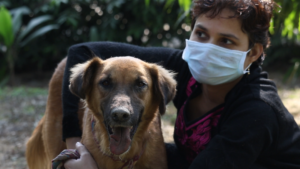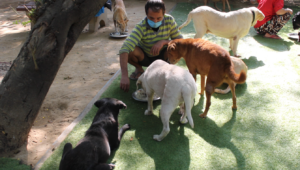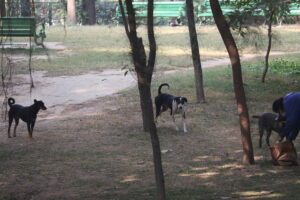Covid-19 bites stray dogs in India hard
It’s not just the humans that have been hit by the coronavirus pandemic. Animals, notably the stray or abandoned ones, are paying an equally heavy price and the few NGOs still operational in the field struggle for survival.
In the hazy wintry sun of New Delhi, two young women sit playing with a dog in a park. From a distance, all looks fine. But going closer, one can see that something is very wrong with the dog. Tied on a makeshift leash, the dog is extremely restless and can’t seem to be able to stay at a place.
Sangeeta Sharma and Preeti Sharma are sisters living in Badarpur in southern New Delhi, on the border with Haryana. They have brought the dog for treatment at a charitable hospital nearly 20 km away in Jangpura. They say that they have been attached to caring for stray dogs for a long while. “We have been taking care of about 35 street dogs in our locality. Even though we are not working and live on pocket money received from our parents, we spend it all on caring for the dogs as no one else bothers to even feed them,” Preeti tells Media India Group.
“People have even begun calling us mad just because we care for the poor animals and cannot ignore their suffering. Their situation has become terrible since the pandemic began as no one is feeding them and we also have limitations on how much money we can spend,” adds her sister, Sangeeta.

Preeti Sharma, a dog lover, says that the government has totally ignored animals, especially stray dogs (MIG photos)
The sisters have brought the dog to Friendicoes, one of the oldest animal care charitable organisations in the city, that runs a trauma centre in Jangpura. Its reputation has meant that people from all across the city turn up with their pets or stray dogs for getting medical attention.
Friendicoes officials say that the situation of stray dogs and other abandoned animals has become alarming since the pandemic hit India and a nationwide lockdown was announced.
“Our problems have increased manifold since March 25 when the lockdown began. We are facing issues on numerous fronts – from pets being abandoned to shrinking donations as well as the disappearance of good Samaritans who used to earlier feed many stray dogs on their own,” says Geeta Seshamani, vice president of Friendicoes, that has been active in the field for well over 40 years now.
NGOs come to the rescue
Sitting in an open ground, petting a female stray with motor deficiencies due to a disease of the nervous system, Seshamani says that Friendicoes began as an animal rescue organisation picking up sick or accident hit animals or abandoned pets in 1979. It today has a lifetime care facility for over 1,800 animals and operates a trauma centre and eight hospitals for animals as well as managing three adoption centres across the National Capital Region.
Seshamani says that the pandemic has hit the stray dogs and other abandoned animals very hard. “It has become much more difficult since the pandemic began. People are not going to offices and it is all work from home. So, the army of dog feeders who used to be there are missing. So, one of the biggest problems we are facing is that a lot more dogs are sick as they are not being fed. India is perhaps the only country where street dogs are seen as community pets which is a wonderful concept. But during Covid-19 it has meant that there is no one to feed them. So we have been doing street feeding for about 2500 animals since March 25 and that is a huge expense that we did not plan on and you cannot stop feeding the animals,” says Amanda Seth, president of Friendicoes.
“Another big challenge that has come to us with Covid-19 is that a lot of people have abandoned their pets. During the first six weeks we got over 150 pedigree dogs tied in the parks or left on the streets as people were scared that their pets, notably dogs and cats, could be carrying Covid-19 and transmitting to them. That created a nightmare for us as well as we knew that they were pets and they could not fend for themselves so we had to take them in,” says Seshamani.
A large number of NGOs in all sectors were forced to shut down soon after the lockdown was announced, due to the challenges of transport, but Friendicoes says it kept its operations on. “All our staff continued to report to work throughout the lockdown, with just one day of absence in the beginning. Donning PPE kits and masks, our team continued to work throughout the pandemic to provide services to the public, with all the precautions that we could take as in the initial days no one knew how Covid could spread – through touch or air. So all throughout the lockdown, we stayed open and I think we did pretty good by the animals,” says Seshamani.
Scanty sterilisations
In India experts estimate that barely 10 pc of dogs have been sterilised and immunised out of a possible 60 million. Government bodies have left most of the steralisations programmes for NGOs to conduct. Friendicoes runs a very large sterilisation programme of stray dogs, with about 55,000 sterilisations taking place each year. But they say the government does not pay for these in time.
“The sterilisation programme is meant to be subsidised if not paid for fully by the government, but we have always found that it is a nightmare to try and realise our payments. They can be as much as one year behind their payments to us and this creates a major problem for a small nonprofit charity like us. Moreover, besides that one programme, everything else is funded through public donations, made by foundations, charities or individual donors,” Seshamani tells Media India Group.
According to World Health Organisation (WHO) an estimated 35 million stray dogs live in India. Even though the number of good samaritans feeding street dogs has reduced, there are still people like Sangeeta and Preeti who continue to take care of the dogs without being scared of Covid-19.
“People in our locality are totally against us feeding the dogs. They think the dogs will bring different kinds of diseases. But, we don’t care much about them. These dogs have no one to look after them. During lockdown we did contact the municipal corporations but they also didn’t help us. The government completely turned a blind eye towards these friendly creatures. On the one hand when they were distributing food to the poor, did they once think about these homeless dogs? But again, why would they? It’s not like these dogs are going to vote for them,” asks Preeti.











